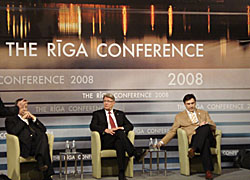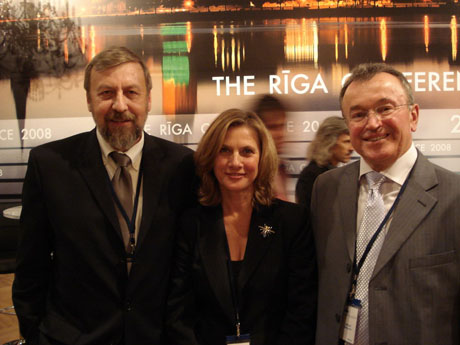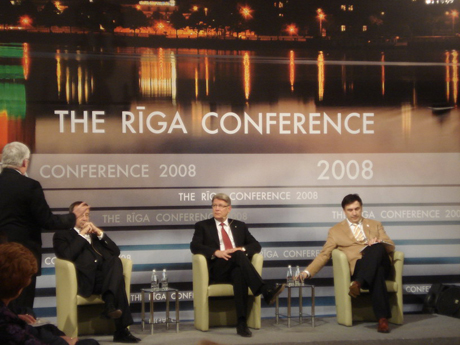Europe fears Belarusian regime gives empty promises
16- 3.11.2008, 13:22

European politicians don’t notice any positive changes in Belarus. There are apprehensions that the Belarusian authorities will reduce to empty promises as usual and try to use this situation for trading first of all with Russia.
Andrei Sannikov, leader of the civil campaign “European Belarus”, told it to the Charter’97 press center. He took part in the 3rd Rīga Conference focused on issues of the European international security.
The conference was held October 31–November 2 in the Latvian capital. The situation in Belarus was discussed at the conference. Besides Andrei Sannikov, our country was represented by Mikhail Marynich, one of the leaders of the “European Belarus”, and Iryna Krasouskaya, leader of the initiative “We Remember”.
“We were interested in new approaches of the European Union to the situation in Belarus. We discussed these issues with representatives of the European Commission, Office of the High Representative of the European Union for Foreign Policy, ministers of foreign affaires of Lithuania and Latvia, Vice Premier of the Czech Republic, and representatives of other European countries. Unfortunately, there were no representatives of Poland at the conference, Poland is considered to be a main initiator of changing policy towards Belarus. The participants of the conference said that this decision of the EU on raising the level of relations with Lukashenka was taken due to insistent affords of our neighbours and certain representatives of the Belarusian opposition,” one of the leaders of the “European Belarus” Andrei Sannikov told to the Charter’97 press center.
According to the politician, the European Union does not have any concrete action plan for a period 6 months, during which restrictions for trips and contacts of the Belarusian authorities are suspended.
“Europeans are going to keep a close eye on the situation in Belarus hoping for concrete measurers to improve this situation. At the moment, they don’t notice any positive changes. There are fears that the Belarusian authorities will reduce to empty promises as usual and try to use this situation for trading first of all with Russia. 6 months given to the Belarusian regime for steps forwards expire in April. If Europeans don’t notice any improvements in the political climate of Belarus, they will have to estimate not only actions of the Belarusian authorities but also the policy of softening relations towards the regime of Lukashenka. The EU’s proposals, made 2 years, remain in force, and Europe is not going to give up its basic position,” Andrei Sannikov said.
The 3rd Rīga Conference gathered prominent policy makers, academics, commentators and journalists offering participants valuable insights and possible solutions regarding recent developments in Europe and its neighbourhood. The debate were focused on the recent challenges for international security, NATO’s global positioning, as well as for the future of EU’s integration and new developments in Russia.
A theme of Russian-Georgian conflict was a main issue of the conference, as Russia’s aggression against Georgia questions challenges to the international security and evoked lots of problems demanding urgent solving. It concerns territorial integrity of independent states, necessity to oppose pressure of Russia, trying to set control over post-Soviet states, first of all. A possible reaction of the West to Russia’s attempts of using all methods to achieve its political goals was also discussed. Besides, the conference focused on NATO running and NATO’s role in the world in future, the future of EU’s integration and EU’s relations with other states. Though the conference took place ahead of the US presidential elections, a large group of the United States’ representatives worked there.
The US elections are expected to answer many questions on the international agenda. As organisers of the conference noted, the world has taken a strategic break which will allow to work out adequate measure to support the international peace and strengthen the basis of the democracy.

Andrei Sannikov, Iryna Krasouskaya and Mikhail Marynich

Georgian President Mikheil Saakashvili took part in the Rīga Conference










